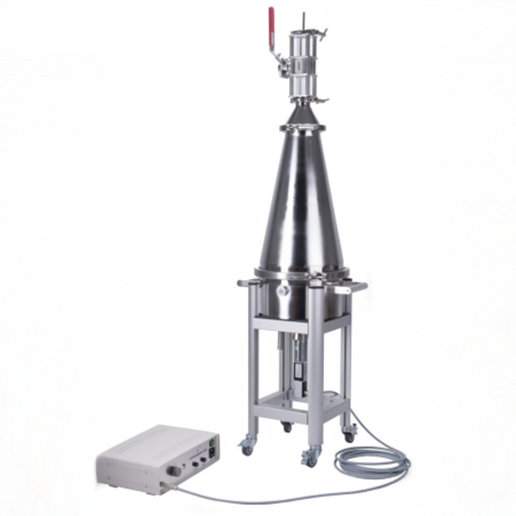- HYDRO-BIOS Apparatebau GmbH
- KC-Denmark A/S
- SubCtech GmbH
- HYDROPTIC SARL
- Seapoint Sensors Inc
- AMT Analysenmeßtechnik GmbH
- Qingdao Watertools Technology
- Qingdao Daowan Technology Co.,

Art.No.: 471 000
Keywords: MPSS, MicroPlastic Sediment Separator
Supplier: Qingdao Watertools Technology Co., Ltd.
Although plastic debris is constantly accumulating in aquatic environments, its impact is not yet fully understood. The establishment of a reliable, verified and standardised method to quantify the amount of plastic particles in the environment plays a key role to assess the consequences of plastic debris in aquatic ecosystems.
We significantly improved the classic density separation approach by launching the MicroPlastic Sediment Separator MPSS. It enables a reliable separation of different ecologically relevant size classes of plastic particles from sediment samples. A ZnCl2-solution (1.6-1.7 kg/L) or SODIUM POLYTUNGSTATE (non-toxic alternative) as separation fluid allows for an extraction of plastic particles ranging from large fragments to small microplastic particles (S-MPP, < 1 mm). Subsequent identification and quantification of the particles with a spatial resolution down to 1 μm can be performed using Raman Microspectroscopy.
MicroPlastic Sediment Separator MPSS
Density Separation of Microplastic Particles from Sediment Samples
Although plastic debris is constantly accumulating in aquatic environments, its impact is not yet fully understood. The establishment of a reliable, verified and standardised method to quantify the amount of plastic particles in the environment plays a key role to assess the consequences of plastic debris in aquatic ecosystems.
We significantly improved the classic density separation approach by launching the MicroPlastic Sediment Separator MPSS. It enables a reliable separation of different ecologically relevant size classes of plastic particles from sediment samples. A ZnCl2-solution (1.6-1.7 kg/L) or SODIUM POLYTUNGSTATE (non-toxic alternative) as separation fluid allows for an extraction of plastic particles ranging from large fragments to small microplastic particles (S-MPP, <1 mm). Subsequent identification and quantification of the particles with a spatial resolution down to 1 μm can be performed using Raman Microspectroscopy.
Sediment Container
The stainless steel sediment container is equipped with a rotor, maintaining a constant stirring of the sample to guarantee a perfect excavation of the particles of interest.
Conical Standpipe
The conical standpipe smoothly reduces the diameter of the instrument to achieve a high particle concentration in the extracted sample volume.
Sample Chamber
The sample chamber is equipped with two glass tubes for easy supervision of the separation process. It can be closed by a ball valve and disconnected from the standpipe. The resulting small sample volume of 95 ml allows for an effective vacuum filtration via the integrated 47 mm filter holder.
Motor
The combination of servomotor and speed controller allows for individually adjusted rotational speeds of the stirrer from 0 up to 20 rpm.
Base Frame
An additional aluminium base frame with brake rollers cares for mobility and stable standing.
Conclusion
First studies of the MicroPlastic Sediment Separator MPSS substantiate recovery rates of 100% for large microplastic particles (L-MPP, 1-5 mm) and 95.5% for S-MPP - significantly higher than the values obtained by application of froth floatation (55% for L-MPP) or classic density separation (39.8% for S-MPP).
For more details please refer to:
Hannes K. Imhof et al. “A novel, highly efficient method for the separation and quantification of plastic particles in sediments of aquatic environments” (Limnol. Oceanogr.: Methods 10, 2012, 524-537)
DOI:10.1002/anie.201606957, Gewässergefährdende Verunreinigungen (german) Deutsche Ausgabe: DOI:10.1002/ange.201606957 "Mikroplastik in aquatischen Ökosystemen" von Natalia P. Ivleva, *Alexandra C. Wiesheu und Reinhard Niessner
recommended separation fluid
TC-Tungsten Sodium polytungstate
Length
46 cm
Width
36 cm
Height
140 cm
Sample volume
max. 6 litres of sediment
Weight on air
22 kg
Materials
stainless steel, glass, PTFE, EPDM
Material of frame
aluminium
Power supply
mains supply 85 - 260 V AC, 500 W
Product ID
471 000





